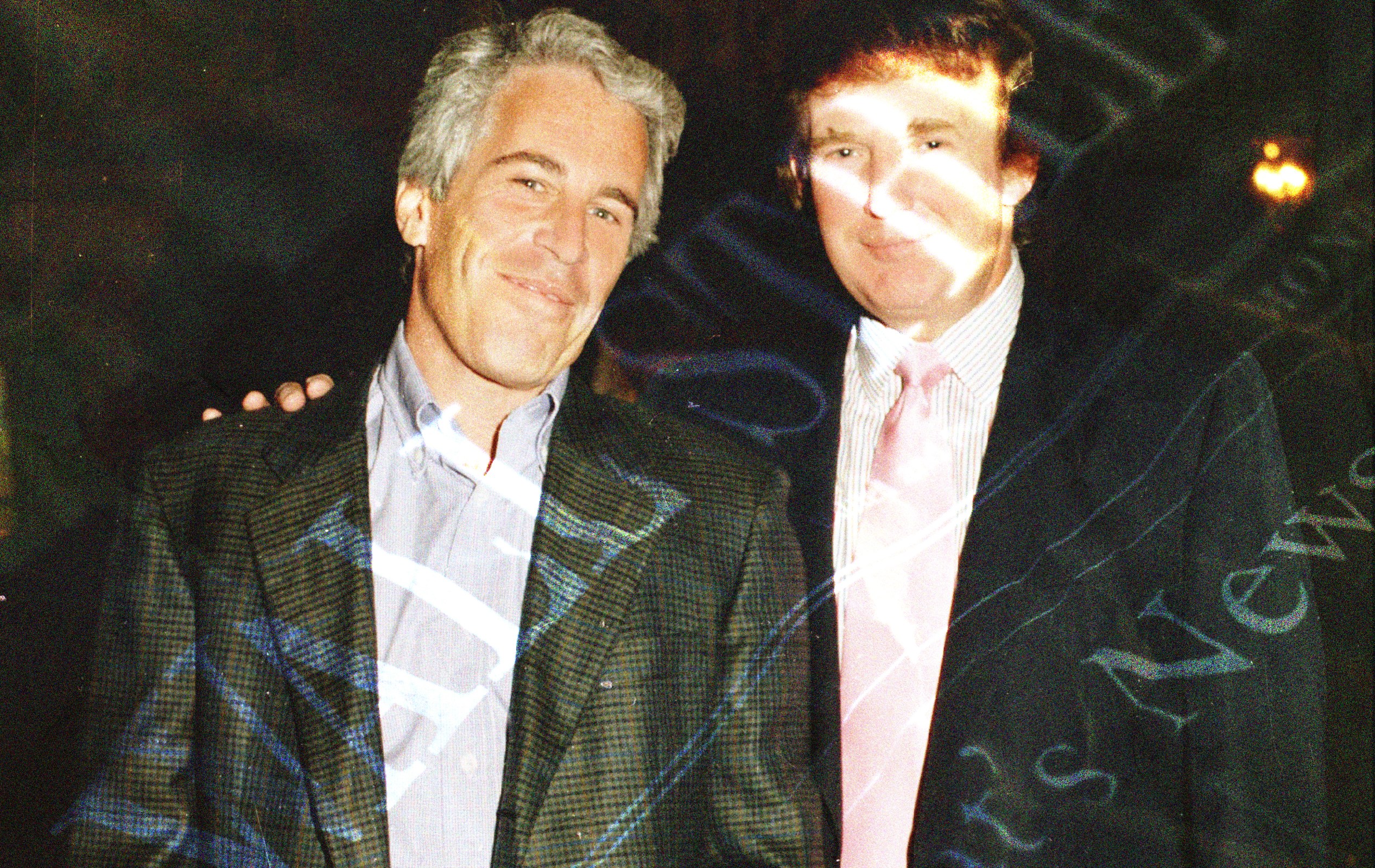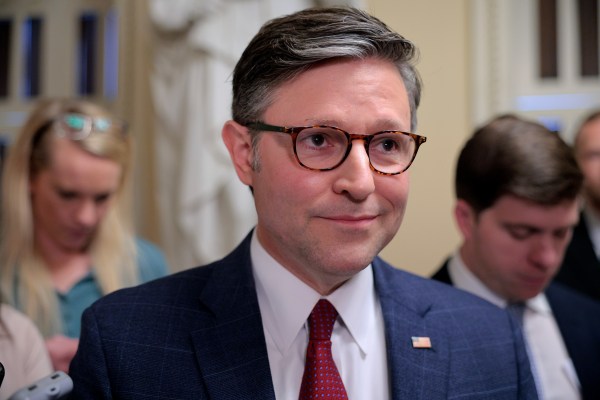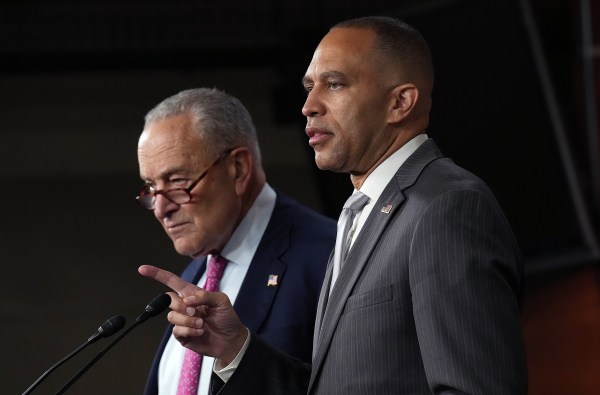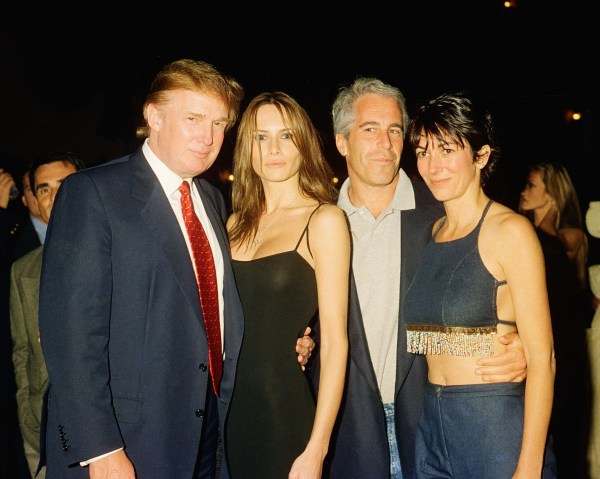It goes to show how dead inside we all are now that I read something last night about a “bawdy” letter the president once sent to an infamous pedophile about their shared interests and came away thinking it was a letdown.
“The sexual innuendo here between the commander-in-chief and a notorious child molester just isn’t explicit enough to do real political damage,” I surmised.
For days, rumor had it that the Wall Street Journal was working on a bombshell about Donald Trump’s relationship with Jeffrey Epstein and that the White House was very worried about it. On Thursday evening, the story dropped. According to the report, Ghislaine Maxwell, Epstein’s now-imprisoned procurer, solicited letters from friends of the late pervert-financier in 2003 to celebrate his 50th birthday and compiled them in an album as a birthday gift.
Here’s how the Journal describes the “bawdy” letter that Trump allegedly sent: “It contains several lines of typewritten text framed by the outline of a naked woman, which appears to be hand-drawn with a heavy marker. A pair of small arcs denotes the woman’s breasts, and the future president’s signature is a squiggly ‘Donald’ below her waist, mimicking pubic hair.”
According to the paper, the text of the letter imagines a dialogue between Trump and Epstein that cryptically mentions having “certain things in common.” At one point, the former says to the latter, “Enigmas never age, have you noticed that?” It ends with Trump wishing his friend a “Happy Birthday—and may every day be another wonderful secret.”
As a non-paying reader, you are receiving a truncated version of Boiling Frogs. You can read Nick’s full newsletter by becoming a member here.
All Trump scandals, even the darkest ones, have funny elements, and this one is no different. Case in point: The president angrily denied to the Journal that the letter was authentic because “I never wrote a picture in my life.” It took no time at all after the story was published for social media to begin filling up with autographed Trump doodles from the past.
Even funnier was the fact that flummoxed populists desperate to discredit the piece were reduced to arguing that the president is too dumb to use fancy words like “enigma” that you might find in, say, a junior-high vocabulary textbook. And in fairness, there’s something to that. The Donald Trump of 2025 speaks not so much in sentences as in buzzwords strung together with nouns and verbs—“strong,” “hoax,” “two weeks,” etc.
But it wasn’t the Trump of 2025 who supposedly wrote the letter to Epstein. It was the Trump of 2003, and in middle age, the president spoke much more articulately than he does now. Even if, for some reason, you can’t believe that a busy man whose books were ghostwritten might have also used a ghostwriter for a letter to a friend, you’re still stuck with the fact that a middle-aged Trump likely knew and used the word “enigma.”
Because, you see, he knew and used it in 2015.
In a better world, the sort that hadn’t already caused us all to die inside, the Journal’s scoop would be the true beginning of the Epstein crisis. It’s further suggestive evidence that the guy who told New York magazine in 2002 that his pal Jeffrey liked women “on the younger side” knew Epstein was abusing minors and took no issue with it. And that would fit with what we know about the president’s character: In Trump’s universe, the only true moral failing is disliking Donald Trump.
Remember, his administration went to bat for Andrew Tate. He’s never been subtle about his indifference when women are abused by him or his allies. In fact, the last time he faced a major scandal over sexual misconduct, he followed the playbook his fans are following now by dismissing comments attributed to him on the grounds that they didn’t sound like him. Guess how that turned out.
The Journal’s story should be the start of the crisis for Trump. In reality, it’s effectively the end.
Lines of inquiry.
There are intriguing questions about the scoop that have nothing to do with what Trump knew about Epstein. To start with, how is it that the newspaper that broke the story happens to be owned by Rupert Murdoch, of all people?
“Mr. Murdoch stated that he would take care of it,” the president complained with palpable disappointment in a Truth Social post after the news was published. All year long, media companies have bent over backward to appease Trump for fear of becoming the next target of his “retribution.” Even as the Journal piece was circulating on Thursday, news came that CBS had canceled Stephen Colbert’s long-running late-night show. Was that truly a “financial decision,” as the network claimed (not implausibly), or was it another tribute paid to Trump by its parent company, Paramount, to secure his administration’s approval for a merger?
In a climate like that, I would not have bet on Murdoch spoiling his chummy relationship with the president by letting one of his papers nuke him on Epstein. Especially since his crown jewel, Fox News, might plausibly be punished for it by losing its special access to the White House, if only temporarily.
Unless Rupert Murdoch is more committed to journalistic integrity than any of us believed, I assume that he came to see letting the story go forward as his least-bad option. Had he quashed it, Journal staffers might have resigned, creating a different kind of PR headache for him. A competitor like the New York Times would have inevitably gotten the scoop, stealing attention that rightly belonged to his paper. And it’s not clear that the average Republican media consumer would have wanted Murdoch to kill the story: The politics of the Epstein scandal are (or were) sufficiently unsettled on the right that Newsmax has begun needling Fox for not covering it enough.
Another intriguing question concerns how the Journal got wind of the letter, which had somehow gone undiscovered for more than 10 years and three presidential campaigns.
The Journal story states that the paper’s reporters “reviewed” the letter, but they don’t claim to have obtained a copy, which suggests that whoever has possession of the album that contains the original allowed them to see it without handing it over. They also allege, interestingly, that pages from the book “are among the documents examined by Justice Department officials who investigated Epstein and Maxwell years ago, according to people who have reviewed the pages.”
“Deep-staters” inside the administration could have conceivably begun leaking material from the Epstein-Maxwell files to embarrass the president. (I’d say “fire up the polygraph machines” but they run continuously in Trump’s DOJ.) If that’s true, though, why didn’t the leaks begin before Election Day last year, when they might have done him real harm? It doesn’t compute.
Alternate theory, then: Allies of Maxwell, not “deep-staters,” have possession of the album and chose to leak Trump’s letter in hopes of gaining leverage for her as she angles for early release from prison. Coincidentally, her family issued a statement three days ago declaring that “our sister Ghislaine did not receive a fair trial” and urging the president to remediate the DOJ’s supposed misconduct in her case.
If the Maxwell family has the letter, showing it to the Journal is an implicit threat and an implicit bribe to Trump. The threat: There’s more where this came from. The bribe: If he figures out a way to let Ghislaine go free, she’ll say whatever he wants her to say to exculpate him in his dealings with Epstein. “The 2003 letter? Oh, I forged it. The Clintons told me they’d murder me if I didn’t.”
One more question. Has there ever been a purer example of a so-called “limited hangout” than the president’s reaction to the Journal scoop?
“Limited hangout” is a crisis-management term of art made famous during the Nixon era. It refers to sharing a little bit of not-very-damaging truth to mislead others into thinking that you’ve been candid while you continue to cover up the larger, uglier scandal. It’s a way to meet the public’s demand for information, hoping they’ll be satisfied with the morsel they’ve been given and not press further.
Straight from the textbook: “Based on the ridiculous amount of publicity given to Jeffrey Epstein, I have asked Attorney General Pam Bondi to produce any and all pertinent Grand Jury testimony, subject to Court approval,” Trump announced last night as buzz built around the Journal story. Aye-aye, Captain, Bondi dutifully replied. Sure sounds like this administration has nothing to hide, no?
No. Grand jury testimony represents a tiny fraction of what the Justice Department has gathered on Epstein and Maxwell. And it’s especially unlikely in this case to reveal dirt on Trump, considering that testimony was obtained during his first term by federal prosecutors who were working for, er, him. If you think DOJ lawyers were pressing witnesses to reveal whether their own boss is a pervert, you’re the chump for whom the limited hangout was designed.
Reading all of that, you might come away thinking that the Epstein saga is gathering force as a political crisis. Not so. Actually, it’s already begun to subside.
Us and them.
The most notable bit in Thursday’s bombshell—apart from the leader of the free world allegedly styling his signature as pubic hair in correspondence with a child-rapist—is the timing. Quote: “Earlier this week, after the Journal sought comment from the president about the letter, Trump told reporters at the White House that he believed some Epstein files were ‘made up’ by former Presidents Barack Obama and Joe Biden and former FBI Director James Comey.”
“After the Journal sought comment.” So that explains it.
For days, the commentariat has puzzled over Trump’s sudden pivot to claiming that the Epstein files were written by Democratic smear mongers. That flew in the face of MAGA canon, which insists that the DOJ has the smoking gun that proves the existence of a vast left-wing pedophilic conspiracy. If the files are actually a liberal hoax created to frame Trump, that belief is up in flames. Why would the president pull the rug out from under his fans that way?
Now we have the answer. He knew the Journal story was coming and scrambled to get out in front of it before it did him real damage among Epstein-credulous populists. And the only way he could think to do so was by throwing his full weight behind turning it into a new loyalty test for MAGA—to the unprecedented point of purporting to excommunicate fans from his movement if they didn’t immediately adopt his “hoax” gloss on what was happening.
It’s the same M.O. he used in 2020 to prepare the ground for his “stop the steal” campaign. Months before Election Day, with polls showing him losing badly to Biden, he began planting seeds of doubt in supporters’ minds that defeat in November could only be the result of chicanery. When defeat arrived, they were primed to view it through that lens. He had warned them that election rigging was afoot, and now here it was.
His problem with the Journal’s Epstein story is that he didn’t have months to prepare the ground to discredit it this time. He had days. So he speed-ran his 2020 playbook, essentially, compressing months of mutterings about the next Democratic “hoax” into 72 or so hours of frantically insisting that Trumpists must choose between believing in him or caring about Epstein. It was an impromptu experiment in whether he could brute-force a sea change in opinion among his cult on one of its core convictions in less than a week by turning the demagoguery dial to 11.
I think it succeeded.
Numerous MAGA influencers who had been wavering on whether to side with Trump or with their conspiracy-crazed audiences on Epstein reacted with Pavlovian predictability to seeing their leader blindsided by the right’s archenemy, the liberal media. (Yes, “the liberal media” includes Rupert Murdoch’s newspaper. Any publication whose news coverage deviates from Trumpist propaganda is considered enemy turf.) Even Elon Musk, who’s been gleefully needling the president over Epstein, fell in line sheepishly. “It really doesn’t sound like something Trump would say tbh,” he tweeted about the letter.
“Nothing unifies MAGA more than a little bit of suspected fake news,” a Republican close to the White House chirped to Politico. That’s the last five days of Trump’s messaging strategy distilled to 12 words. Me or the fake news? Us or them? Once it came to that, there was never a doubt which way a movement created by and for demagogues would tilt. That a damaging story published by a reputable newspaper would cause Trump supporters to grow less skeptical of the president, not more, is an elegant commentary on how corrupting populism is.
That’s why I say that the Journal’s bombshell is effectively, and ironically, the end of the scandal as a political threat to Trump rather than the start. MAGA simply lacks the civic integrity to keep pursuing the truth about Epstein now that it’s been transformed, stupidly and cynically, into a referendum on the media. If they cared earnestly about the truth, Thursday’s scoop would galvanize them to demand more answers from the DOJ. What they actually care about is having their suspicions confirmed that prominent Democrats are degenerate child traffickers.
If the Epstein files aren’t going to do that for them—worse, if there’s a chance that they’ll show that Donald Trump is a degenerate—then they’d rather not know. They’ll back off and let the matter drop, especially once the president’s limited hangout gives them a pretext to say they’re satisfied.
Well, most will.
Dead inside.
There will be a faction of hardcore populists who persist in raising the Epstein matter, even as the rest of the right drops the subject.
It will probably be the same Tuckerite faction that continues to object to bombing Iran and sending weapons to Ukraine even as the great mass of Republican voters falls instantly into line with Trump on both subjects. That’s the nucleus of “fundamentalist MAGA” that’s taking shape ahead of 2028. Devotees who believe the future of the party lies in moving further toward postliberalism have strategic reason to try to foment grassroots suspicion about the president.
But that position will be ghettoized, with most Republicans opting instead to pass the latest loyalty test, as they always do. Granted, the polling that I flagged on Wednesday shows real interest among Republicans about seeing what’s in the Epstein files, but there’s no evidence that their frustration about that is overriding their support for Trump. On the contrary, his job approval is solid. Given a choice between blindly backing him and satisfying their curiosity about a fiendish elite pedophile with lots of powerful friends, we can be very confident about how they’ll choose.
Besides, Trump is savvy enough to keep flogging the us-and-them angle he’s created to reinforce his argument that credulity about Epstein makes one a dupe in a liberal-media ploy. I believe him when he says he’s going to sue Rupert Murdoch and the Wall Street Journal; even if he doesn’t win, and he almost certainly won’t, the ongoing litigation will remind Republicans periodically of who their enemy is in this episode. Or maybe Trump will end up squeezing Murdoch into paying him off via a “settlement” as he recently did with Paramount.
Come to think of it, that might explain why Murdoch was willing to let the Journal publish the piece. Ultimately, all he needs to do to smooth this over is to cut Trump a check.
When the dust settles, I suspect the average American will be left without a way to satisfy his or her curiosity about Epstein. Lord knows, the Trump Justice Department isn’t going to let a little thing like public interest or democratic accountability cause it to release information that might upset the boss. Meanwhile, media outlets that pursue the story will know to expect fierce “retribution,” financial and otherwise, for doing so. And to what end? To have Trumpers who claimed to care deeply about pedophilia six days ago scream in their faces about “fake news”?
Thank goodness we’re all dead inside, as otherwise the pathos of our national decline might kill us. Happy weekend.











Please note that we at The Dispatch hold ourselves, our work, and our commenters to a higher standard than other places on the internet. We welcome comments that foster genuine debate or discussion—including comments critical of us or our work—but responses that include ad hominem attacks on fellow Dispatch members or are intended to stoke fear and anger may be moderated.
With your membership, you only have the ability to comment on The Morning Dispatch articles. Consider upgrading to join the conversation everywhere.